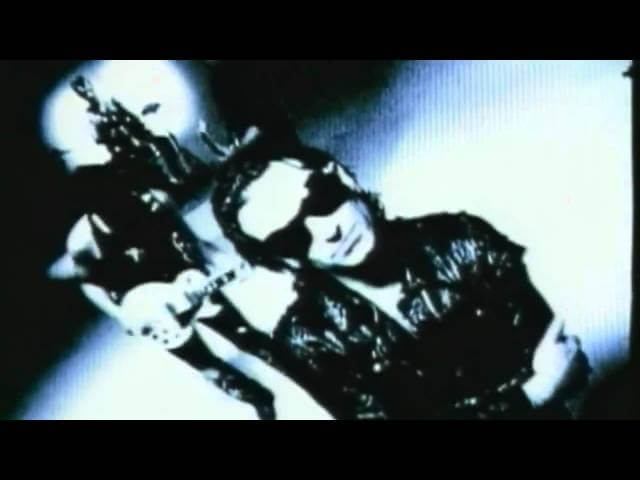On its 25th anniversary, Achtung Baby remains U2’s defining achievement

As rock bands set on changing the world go, U2 has actually followed through and done some tangible good for important humanitarian causes. That doesn’t negate the fact that, for many, its sermonizing on the mount can be a turnoff. I felt that during one of the last times I saw the band in concert, where the sight of 50,000 upper-middle-class concertgoers pumping their fists in solidarity for detained Burmese politician Aung San Suu Kyi left me wondering how many of these people had heard her name before Bono said it—or would remember it on the drive home. There’s always been something slightly insincere about Bono’s intense sincerity: As South Park once scatalogically satirized, there’s something about Bono, even despite all the good he’s done for the world, that just makes him seem like a piece of shit. It’s a contradiction that was first established 25 years ago, when U2 released its defining masterpiece, Achtung Baby.
Conceived in the early days of a unified Germany—in the same Berlin studio where David Bowie recorded Low—Achtung Baby remains one of the great second acts of rock ’n’ roll. That divide of U2 into a “before” and “after” began with an album that was uncharacteristically apolitical for a band who, only four years earlier, was singing about U.S. military intervention in El Salvador. Having been rightly mocked for its grandiloquent journey-to-the-center-of-America’s-soul that produced Rattle And Hum, with Achtung Baby the band dropped the flag-waving and actionable callouts to reimagine U2, wholly and dramatically. Gone, at least temporarily, was the bombast and grandiosity of its 1980s iteration—the blues duets with B.B. King, the come-to-Jesus lyricism. The ’90s began with U2 acknowledging its own self-indulgence through irony and humor.
The birth of Achtung Baby also came at a time of internal strife, the kind of acrimony that music documentarians dream of recounting years later (see 2011’s From The Sky Down). Fueled by that uncertainty, U2 was never more daring as an ensemble. Whereas early U2 demanded listeners to care deeply about the assassination of Martin Luther King Jr. or the Troubles in Northern Ireland, Achtung Baby advocates for letting go and surrendering to desire. The album’s unifying theory arrives in the first few words out of Bono on skronky opener “Zoo Station”: “I’m ready, ready for the laughing gas.” The album calls not for reaching the lofty heights where the streets have no name, but blindly falling backward and trusting that it’s all right, all right.
Sonically, the album is permeated with a dark metallic finish, in the same way The Joshua Tree was colored a desert-dusted clay hue. On “The Fly,” its propulsive lead single, producer Daniel Lanois cranks the guitar distortion to the extreme right, leveling The Edge’s jangly peal like a chainsaw. The full list of satisfying moments runs long: Adam Clayton’s bass line on “Mysterious Ways.” Larry Mullen’s atomic-clock-precise drumming on “So Cruel.” Bono’s “love, love” bridge on “Until The End Of The World.” The wide-screen expansiveness on “Who’s Gonna Ride Your Wild Horses.” The way the bitter and heartfelt “One” slow-burns from a single guitar to a stadium sing-along. It’s a varied musical and emotional journey that completely redefined what an U2 album could sound like.
If Achtung Baby was U2 pressing the reset button, the Zoo TV Tour that followed replaced the machine altogether—a dizzying, elaborate, surreal rethinking of what’s possible in a stadium concert tour. It was a visual spectacle of belly dancers, a skyline of stacked TV screens, and Trabants suspended overhead, matched by a flawless sequencing of songs that began with opener “Zoo Station,” followed by “The Fly,” “Even Better Than The Real Thing,” “Mysterious Ways,” “One,” a snippet of “Unchained Melody,” then “Until The End Of The World” and “New Year’s Day.” It was such a kinetic experience, thematically and musically, it barely gave you time to think. And when it did come time to ponder weightier matters, even that was subsumed by the show.
The same Bono, who only years earlier, marched down the Red Rocks stage waving a flag like a counterrevolutionary, was now slinking around stadiums in leather and giant black sunglasses as comic-book villain “The Fly,” named for the song where Bono uses a fuzzed-out sinister whisper. It was a self-parody of excess, and a biting one at that: “It’s no secret that ambition bites the nail of success,” he sings.
 Keep scrolling for more great stories.
Keep scrolling for more great stories.
